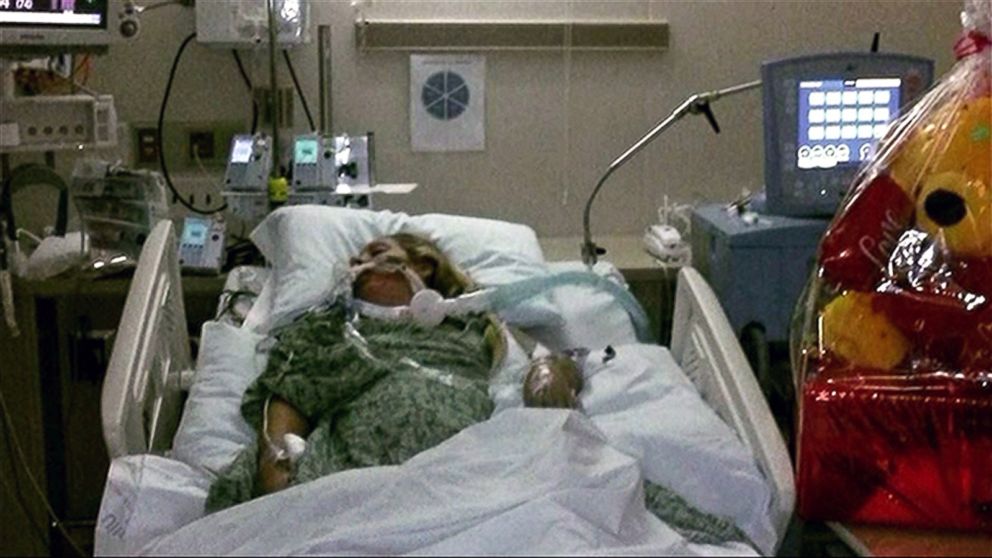Undetected Ectopic Pregnancy Leaves Woman in Coma
Lisa Avila was 12 weeks pregnant when she woke up in pain on Valentine's Day.
— -- The family of a pregnant woman who has been in a coma since Sunday is blaming the hospital that they say failed to realize she was experiencing a ruptured ectopic pregnancy and bleeding internally.
Lisa Avila, 36, of Anaheim, California, was 12 weeks pregnant when she woke up on Valentine's Day with severe pain in her abdomen, her aunt, Jessica Jule, said at a news conference Tuesday. Doctors at Anaheim Regional Medical Center's emergency room did an ultrasound, said her baby was fine and sent her away with a prescription for painkillers, Jule said.
Afterward, her husband left her in their car while he went into a pharmacy, and when he returned, Avila was unconscious and not breathing, Jule said. Paramedics rushed her back to the same hospital, where they learned Avila had an ectopic pregnancy, meaning the fetus was developing outside the uterus, Jule said.
The ectopic pregnancy ruptured, causing her to bleed internally, the aunt said.
"She needed emergency surgery to stop the bleeding," Jule said at the news conference outside the hospital.
The next day, Avila, who has seven other children, slipped into a coma, Jule said.
"Why did they make my niece leave this hospital when obviously there was something wrong?" Jule said. "How could they say the baby was fine if it was an ectopic pregnancy and you did an ultrasound?"
Avila's family, including Jule, could not be reached by ABC News for comment.
Anaheim Regional Medical Center released the following statement:
"Patient safety is Anaheim Regional Medical Center’s foremost priority and we are committed to providing the highest quality care to every patient we serve. The physicians, nurses and staff at Anaheim Regional Medical Center care deeply for the health of this patient and our thoughts and prayers go out to her and her family. Patient privacy laws prevent us from sharing any additional information."

Ectopic pregnancies are relatively common and occur in about 1 percent of all pregnancies, said Dr. Marjorie Greenfield, chief of general obstetrics and gynecology at UH Case Medical Center in Cleveland, Ohio. As a result, hospitals have experience spotting and treating them, she said.
"Some of them are very easy to diagnose, and they get diagnosed every day in the emergency room," she said, explaining that if a woman has a positive pregnancy test, but a doctor can't spot the embryo in the "frame" of her uterus on an ultrasound, that's usually enough to diagnose an ectopic pregnancy.
But sometimes a doctor can't spot an ectopic pregnancy until he or she operates, said Dr. Keith Eddleman, director of obstetrics at The Mount Sinai Hospital in Manhattan.
"If you have a patient in the first trimester with abdominal pain and bleeding and you can't see the pregnancy inside the uterus -- and you have a positive pregnancy test -- you have to assume it's ectopic until proven otherwise because it is life-threatening," Eddleman said.
Although most ectopic pregnancies develop in the fallopian tubes, they can also develop on the ovary or elsewhere in the abdomen, but it's extremely rare, said Dr. Jennifer Ashton ,a senior medical contributor for ABC News and practicing obstetrician-gynecologist. Another rare possibility that would make an ectopic pregnancy harder to diagnose would be something called a heterotopic pregnancy, or when one embryo starts developing in the uterus and another starts developing in the fallopian tube.
Ectopic pregnancies usually rupture at about five or six weeks, when the fallopian tube can't stretch to hold the developing embryo as it grows, so a 12-week ectopic pregnancy is unusual, Greenfield said.
"Ruptured ectopic pregnancy is the number one cause of maternal mortality in the first trimester," Ashton said. "If it ruptures, women can lose liters of blood very quickly."
Signs include pelvic pain on one side, dark red vaginal bleeding and a positive pregnancy test, Ashton said. Because they ultimately lead to life-threatening miscarriages, treatment for ectopic pregnancy is usually surgery or medication to end the pregnancy.
None of these doctors has treated Avila.





